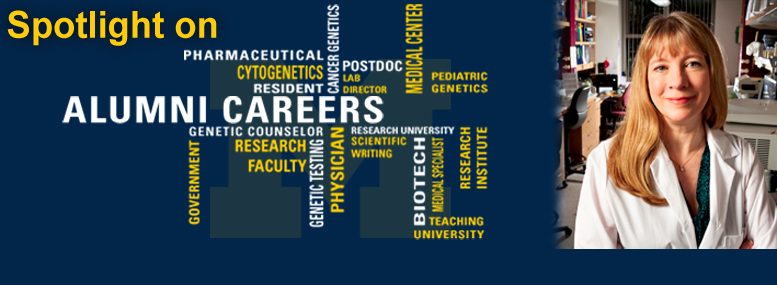
Gail Jarvik (MD, PhD, 1986) is amazed at how the field of genetics has taken off in the last few decades. “What we can do for families now is light-years different than what we could do before.”
As the Arno Motulsky Endowed Chair in Medicine, Professor, and Head of the Division of Medical Genetics at the University of Washington, Gail sees both sides of the “bench to bedside” paradigm. In her own lab, Gail combines “wet-” and “dry-lab” techniques to ask questions about the genetic basis of complex disease. Indeed, since her PhD training with Charlie Sing, inherited genetic disease has been a major focus of her research. Her thesis involved studying genes influencing levels of apolipoprotein B, a determinant of LDL cholesterol and heart disease, the number one cause of death in the developed world. “I still work on Apo B today!
My PhD provided me a good education on complex disease.” Gail’s knowledge of genetic disease extends from the lab and into the clinic. Her Division is in charge of the University of Washington Medical Center’s Genetic Medicine Clinic, devoted to adult genetic diagnoses such as cardiovascular, collagen, and neurogenetics disorders. “We have a large, diverse clinical group which really allows us to learn from each other.” Most faculty hold PhDs, many of whom are also boarded in Molecular Medicine or Molecular Pathology. “It gives them the opportunity to get into the clinic, to give them perspective.”
Gail sees science becoming less of a solo endeavor, and much more of a team sport. “Science is moving in a very collaborative direction, especially for translational health problems.” She is currently a Principal Investigator on the Clinical Sequencing Exploratory Research Consortium, supported by the National Human Genome Research Institute and National Cancer Institute. “In your own research, you direct what you’re doing. In consortia, you have common goals that require coordination. You get to work with many talented people even more closely than you would otherwise, and it’s been really rewarding.”
Gail cites her patients as a major driving force in her research. “My patients really inspire me. They’re dealing with difficult things in their life, but you can see genetics making a real difference.” To today’s students, she recommends to learn from smart people, and keep learning. “Brush up on your programming skills. It’s essential.”
